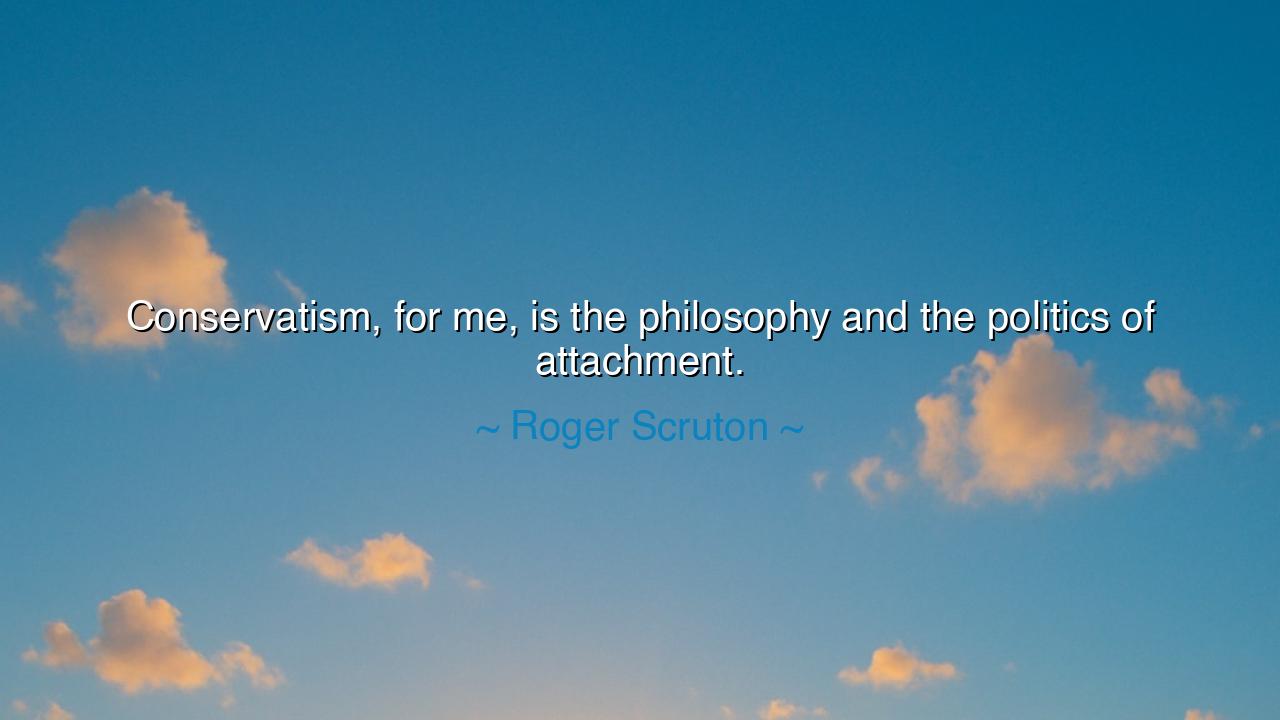
Conservatism, for me, is the philosophy and the politics of






In the words of Roger Scruton, conservatism is not merely the defense of laws or the upholding of institutions, but the philosophy of attachment—a devotion to the bonds that tie us to home, to family, to community, and to the land that bore us. Where others see politics as a mechanism of power, Scruton saw it as the tender guardianship of what is loved. To be attached is to recognize that life gains meaning not in isolation, but in the web of duties, inheritances, and affections that cradle the human soul.
Consider the image of the home, which Scruton so often revered. The house built by one’s grandfather, where the oak tree in the yard has witnessed generations of laughter and sorrow, carries within it more than wood and stone—it is the vessel of memory. To tear it down in the name of progress without reverence for its spirit is to sunder the invisible cords that bind the living to the dead, and the present to the unborn. Thus, attachment becomes the anchor of human flourishing, for without it, men drift rootless, seeking belonging in empty promises.
History offers us a tale: after the French Revolution, when old traditions were cast down in the fire of abstraction, society was left adrift in chaos. The destruction of the old order, of parish, guild, and throne, promised liberation but yielded blood and terror. Scruton reminds us through his words that true order and harmony arise not from the violent severing of bonds, but from the preservation of attachments—to faith, to place, to shared inheritance. What was despised as “burden” was in truth the glue of civilization.
In this sense, the politics of attachment is not stagnation, but stewardship. It calls upon each generation to receive what is handed down, to care for it, and to pass it on enriched but not destroyed. It is the wisdom of the farmer who tends the soil not only for his own harvest but for the fertility of his children’s fields. This labor is not glamorous, nor does it boast of revolutions—but it endures, and in endurance lies civilization’s strength.
So let it be known, O children of the future: freedom without attachment is an abyss, and progress without memory is ruin. To conserve is not to cling in fear, but to cherish in love. It is to say: here I belong, among these people, in this land, with these customs that give shape to my being. The man who knows his attachments is never truly lost, for he carries within him the map of his soul and the compass of his people.






ANQuynh Anh Nguyen
Scruton’s definition of conservatism as attachment resonates with the idea that people often find strength in their connections to the past. It’s interesting, but I also wonder whether such attachment can be limiting when faced with urgent issues that demand change. For example, in addressing climate change or social justice, can conservatism’s attachment to tradition lead to solutions that are too narrow or not forward-thinking enough?
TPhuynh tan phat
Roger Scruton’s perspective on conservatism being about attachment really highlights the emotional and psychological ties that bind individuals to their cultures and histories. But does this attachment create an ‘us versus them’ mentality, especially in times of societal division? How does conservatism reconcile attachment to certain values with the need for inclusivity and progress for all groups in society?
NT- Lop12B1 Ho Ngoc Tai
Scruton’s framing of conservatism as ‘attachment’ makes me think about the role of loyalty and tradition in shaping political and social views. Yet, I wonder if this attachment sometimes leads to stagnation. Are we so attached to certain values that we fail to critically assess them in light of contemporary realities? How can conservatism evolve in a way that respects its traditions but also meets the challenges of modern society?
Qqanh
Scruton’s idea that conservatism is about attachment raises an interesting point about the value of belonging and continuity in society. But it also makes me wonder, how do conservatives navigate the tension between attachment and detachment from the modern world? In a time when rapid technological and cultural shifts are happening, can conservatism remain relevant without compromising its foundational values? Is attachment to tradition enough to face today’s global challenges?
HHHuong Ha
I find Scruton’s definition of conservatism as attachment to be thought-provoking. It seems to emphasize the importance of relationships and communities, which can indeed form the foundation for stability and societal cohesion. However, does this attachment also imply an unwillingness to evolve? If we are too attached to the past, can we risk overlooking the need for social or political reform? How can conservatism balance attachment to tradition with openness to necessary change?